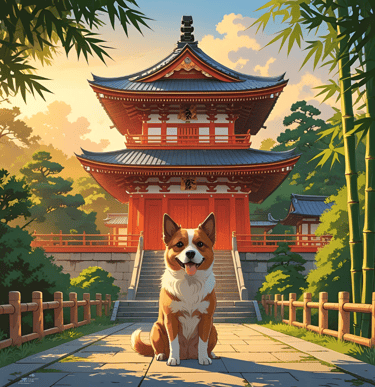The Dog in Japanese History: From Guardian to Symbol of Loyalty
Discover how dogs have been part of Japanese history — from spiritual guardians to national symbols of loyalty and unconditional love.
CURIOSITIES
6/6/20252 min read


🐾 Introduction
Many people don’t realize that dogs have played an important role in Japanese culture for centuries.
Far beyond being pets, dogs in Japan have been seen as spiritual protectors, war companions, and even eternal symbols of loyalty.
In this article, we’ll explore the journey of dogs throughout Japanese history and discover why they hold such a special place in the heart and soul of the Japanese people.
🏯 Spiritual Origins: Dogs as Guardians
In ancient times, especially during feudal Japan, dogs were more than mere companions — they protected villages and families, being associated with strength and vigilance. In many Shinto shrines, it’s still possible to find statues of dogs (or similar creatures such as komainu) acting as spiritual guardians at temple entrances.
🐺 Dogs in Times of War
During clan wars and the samurai era, dogs were trained for specific tasks such as messengers, field protectors, and even natural alarms. Some Japanese breeds, like the Kishu and Shikoku, trace their roots back to these turbulent times and were highly valued for their bravery and loyalty.
🐕 Hachiko: The Dog Who Became a Legend
No story about dogs in Japan would be complete without mentioning Hachiko, the Akita who waited for his owner for years at Shibuya Station — even after his master’s death. This true story touched the hearts of both Japan and the world, immortalizing Hachiko as the ultimate symbol of canine loyalty. Today, his statue remains an iconic landmark in Tokyo.
🧧 Dogs in Festivals and Traditions
Dogs are also part of various cultural traditions. In the Japanese zodiac (Juunishi), the dog represents one of the 12 signs, symbolizing honesty, protection, and loyalty. During certain rural festivals, dogs are blessed to ensure the safety and well-being of families.
🏠 The Modern Role of Dogs in Japanese Society
Today, dogs continue to play an important role. With Japan’s aging population, many people see dogs as family members and sources of emotional or even therapeutic companionship. The respect for the history and symbolism of dogs remains deeply ingrained in Japanese culture.
🐾 Conclusion
The presence of dogs throughout Japan’s history goes far beyond daily companionship. They embody deeply rooted values such as loyalty, protection, and mutual respect. From spiritual guardians to national icons like Hachiko, dogs continue to move and inspire generations. Understanding this historical and cultural bond is essential for anyone who loves animals and wishes to appreciate the unique way Japan cherishes its four-legged friends.
